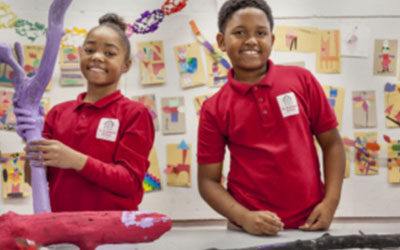To read this article on the Richmond Times-Dispatch website, please click here.
By DR. CYNTHIA WELDON-LASSITER
Conversations; the exchange of ideas; shared perspectives. This is where change and progress can happen. When discussions include a diverse group of people, they open the door for enlightenment, learning, and growth. Communities are stronger when they work together.
The cradle-to-career continuum is an essential topic that benefits from diverse perspectives. This continuum describes a child’s entire educational experience from infancy to adulthood. Over the past five years, the greater Richmond community has seen a negative impact on programs designed for those at the beginning of the continuum, and we’ve experienced a marked decline in the number of high-quality early childhood preschool programs due to financial strains, new strategic directions, or both.
It is undeniable that access to high-quality education at a young age sets the tone for future success. This is a conversation our larger community needs to have.
At St. Andrew’s School, we believe that equity in early childhood education leads to success in life — and this is where we’re starting our conversation. Far too often, equity and equality in education are used interchangeably, but it’s important to know the difference. Equality means every student has equal access to education, which in itself is important, but does not close the opportunity gap that exists in education. Equity is about giving students the unique support they need — taking into account diverse needs — to be successful. How have we done this?
We realized opportunity gaps were created and perpetuated during long summer breaks, when students can lose two to three months of reading and math skills. To mitigate this, we designed and implemented an Extended Learning Time model. This model takes two important dimensions into account: the number of hours in the school day and the number of days in the school year. We chose to embrace both dimensions and now provide students with 1,400 hours in school from early August to mid-June.
Research from the National Center on Time & Learning — “The Case for Improving and Expanding Time in School” — indicates that adding time to the school year and/or day can have a positive impact on a child’s entire educational experience, meaning an impact from cradle to career. This model allows for broader and deeper coverage of curricula, more individualized learning support, and more time devoted to enrichment classes and activities that expand students’ educational experiences that boost engagement in school.
In just the first year, we saw admirable gains in reading scores from all grades. We set a S.M.A.R.T. goal (Specific, Measurable, Attainable, Relevant, and Time-bound) for a minimum of 80 percent of all students achieving at least one year’s growth in reading, and not only exceeded that goal, but more impressively, nearly 50 percent of those students are now reading above grade level.
Historically, there are lessons we have learned from the Perry Preschool Project, a famous continuous education study of the past 50 years.
Much like cradle to career, this study followed participants from preschool to adulthood. The study demonstrated the short- and long-term benefits of equitable, high-quality early childhood education for preschool children living in low-income households.
The longitudinal study was conducted in the 1960s and began with 128 3- and 4-year-old African-American children. Follow-up interviews were conducted when participants were approximately 15, 19, 27, and 40 years old. At age 40, the participants who had attended the preschool at ages 3 and 4 provided detailed information about their lifecycle trajectories, which documented significant benefits on educational attainment, income, homeownership, and other important life outcomes.
It is with this equity-driven mindset that St. Andrew’s School is challenging and changing systemic inequality in early childhood education, and we are inviting you to be a part of the conversation.
To forge relationships that strengthen the greater Richmond community’s cradle-to-career continuum, we are hosting our inaugural Carol Wingo Dickinson Thought Leaders Series event on Thursday, April 11.
At Cradle to Career: Equity and Social Justice in Early Childhood Education, Kathy Glazer, president of the Virginia Early Childhood Foundation, will address the state of early childhood, and a panel will include perspectives from Dr. Andrew Daire, dean of VCU’s School of Education, as well as parent and administrative leadership from St. Andrew’s School. With additional help from Dr. Beatrice Fennimore, professor of education at Indiana University of Pennsylvania and author of “Standing Up for Something Every Day: Ethics and Justice in Early Childhood Classrooms,” this event will explore how we as a community can work together to build and strengthen an equitable cradle-to-career education continuum.
We are creating space around the table to deepen connections and encourage thoughtful community action that can lead to success for all students from cradle to career — and we want you to join the conversation.

